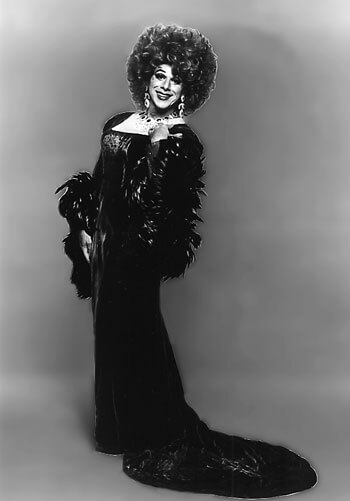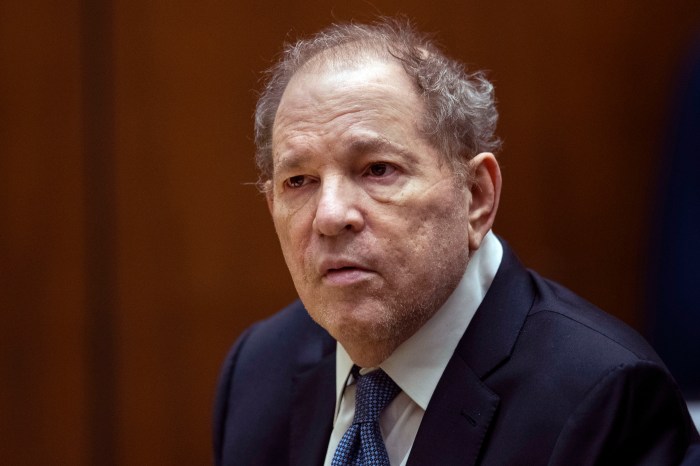Ira Siff prepares his protégé, Madame Galupe-Borszkh, for Symphony Space
Mme. Vera Galupe- Borszkh— the last, the very last prima donna of the drag troupe La Gran Scena Opera— is one of the great comic creations of our time. Screamingly funny to longtime fans (including some of the divas she’s based on) and total newcomers to opera (her comic timing and broad humanity ensure that), she also offers scrupulous musicality and more movingly committed singing than you’re likely to hear from many of today’s bland, airbrushed sopranos. Her precious farewells and comebacks have highlighted New York’s seasons for years. Next week, accompanied by Maestro Sergio Zawa (Metropolitan Opera Assistant Conductor Lucy Arner in drag), Madame essays arias, art songs, the inevitable “cross-over” numbers and encores. Gay City News spoke recently with both Mme. Vera and her artistic director/creator/alter ego Ira Siff.
Gay City News: How did Vera Galupe-Borszkh come to be?
Ira Siff: I had fooled around with falsetto singing for years, and had quite a range and considerable volume. But, I was warned off it when I began “serious” studies as a singer. So, it was dormant until I was about 35. Pity. In my cabaret show, which I did constantly in the late ’70s and early ’80s, I had a number of characters I’d created, all of whom sang. One was a sort of Renata Scotto diva, singing “I’m-a-gonna-washa-dat-man-right-outa-my-hair,” as if on the Mike Douglas show, doing cross-over. A Dominican fan of my cabaret show, Mario Villanueva, invitated me to a show he did with his cousin, a two-divas event, in which they were gowned and sang arias. It was very funny, and his cousin was exceptionally musical; but the cousin was going home. I offered myself as a partner to do this in a theatre. I worked the falsetto back up, which took a while. Eventually, I was singing “in questa reggia” and Vera was born.
GCN: What led you to discover your “inner” traumatic soprano? Whence her “look” and moniker?
IS: My inner traumatic soprano emerged, full blown, as it were. She needed very little coaxing. The background I had in watching opera since I was 15 gave me two decades of dementia on which to draw. Seeing Rysanek, Scotto, Milanov, Callas, Olivero and Caballé, was perhaps the biggest influence. But Vera soon became her own creature. The moniker was made up on the phone with my first music director, Richard Burke. We were looking for a double-barrelled hyphenated creation of vague origin. Then I filled in the bio to go with it. The look was dowdier at first. Vera was padded to be heavier, more Milanovian of figure. Then, when I began to enjoy the dressing up (I hated it at first), she became more glam, in her own bizarre way, of course.
GCN: How have you maintained separate identities as Vera’s “enabler” and as a respected vocal coach, performance/recording critic and opera director?
IS: In a way, I got started as an operatic vocal coach and voice teacher, and a stage director because of Gran Scena. On the other hand, some people think I can only do comedy, or that the vocal technique that has taken me to age 58, singing falsetto soprano for 23 years, is an accident. The Vera thing is double-edged. The opportunity to review and write articles for Opera News has lent credibility. Everywhere I go to direct, people come up and talk about the Opera News work. I am so grateful to [editors] Brian Kellow and F. Paul Driscoll for this.
GCN: What’s on your horizon?
IS: I’m directing a little Seymour Barab one-act opera for New York Chamber Opera at Symphony Space right after Vera’s shows. Next season I’m semi-staging “Fanciulla del West” for Aprile Millo with Eve Queler’s OONY, and directing “Lakmé,” my third time at Sarasota Opera. I’m writing a few pieces, including a Tebaldi piece I’m very excited about. I’m trying to buy a country house and a car, so I’ll be singing arias on the street with a cup. I need a life. It’s been all work, work, work. I’m hoping the country get-away will restore a little free time to my schedule, and that I can actually learn to say no to things often enough so my boyfriend and I can see each other! But, of course, there’ll be another series of Comeback Recitals for Vera next season. Next time, I’m shifting into song repertoire, which suits her so at this stage, after my final fling doing huge opera scenas this time. It’s time for more Kunst [art] and less Stimm [voice], and there are so many wonderful songs in so many unpronounceable languages. Plus, I totally miss La Gran Scena; in some cases, like Keith Jurosko’s 105-year-old diva, they are [Vera’s] equal or superior. It’s tough logistically to pull the troupe back together after almost two years, but I would like another go, and I know people want to see it. We may do the show in Spanish in New York next season. We’re looking hard for a Spanish theater company to collaborate with. Our Spanish show was a big hit in Spain and South America. If we have a backer, (Hello out there, Mr. Gay Man looking for a tax deduction for a non-profit!) we will revive the full company in New York.
A chat with Mme. Vera Galupe-Borszkh:
GCN: So, were you covering for Aprile in “Gioconda”? Have you indeed ever covered anyone (or anything)? Who covers you?
MVGB: I don’t cover nobody, thank you so much. Not even Millo. Especially not Millo, in fact, because she can actually sing! I am no replacement, and likevise irreplaceable. If I cancel (which I have done only once in my life; a rival poisoned the blini) the opera is called off. Who wants to see somebody what ain’t me?
GCN: What is the best (and worst) advice ever given you by a conductor? By a colleague?
MVGB: My late husband. Maestro Galupe adwised me to never listen to conductors (or, watch them, for that matter). Every artiste has her specialité, her metier, or, as we say in opera, her Fach. My Fach was always bel canto. But these conductors want you to sink everything! Verdi, Wagner, Strauss, Puccini. I was completely Fached up! I was a spinto but I almost became a spento! The best colleague advice was sink softer. The worst was sink softer. Fortunately I never listen to colleagues.
GCN: Where do you stand on the “little black dress” controversy?
MVGB: I haven’t worn black since the funeral of my late husband, the last living castrato. And I changed for the entertainment portion of the funeral, in which I sank a medley of sixteen of my most famous arias. If you’re axink about fat sinkers, I’m all for it.
GCN: How about innovative stagings? What is the proper function of an opera director?
MVGB: I love innovative staginks if it was my idea. Like my underwater “Tosca” at the Baths of Caracalla. Otherwise, I walk out. Stage directors should be like Marcel Marceau: seen and not heard from.
GCN: Are you presently collaborating with Deborah Drattell, Jake Heggie, Marvin Hamlisch, or other leading composers on important new works?
MVGB: I just completed my new Philip Glass CD, “The Four Last Notes.”
GCN: What should audiences bring to Symphony Space?
MVGB: They should brink the word “brava!” and use it frequently and loudly, plus flowers to throw and giff. And recorders to make pirate tapes. This recital program is ambitious as always—more so, as I am resurrectink two scenas from my youth, vhat I haven’t sank in almost twenty years. One, the final scene from Donizetti’s “Roberto Devereux,” is a huge, difficult scena. A great mad scene – well, at least it’s a mad scene when I sink it. Therefore, the program is more heavily operatic than usual, which is the opposite direction most ol’—mature—divas go in. But, I ain’t most divas.
GCN: What becomes a legend most?
MVGB: Come to the recital and see. I’ll be vearink it!
David Shengold (shengold@yahoo.com) writes for “Playbill,” “Opera “and “Opera News” among other venues.


































